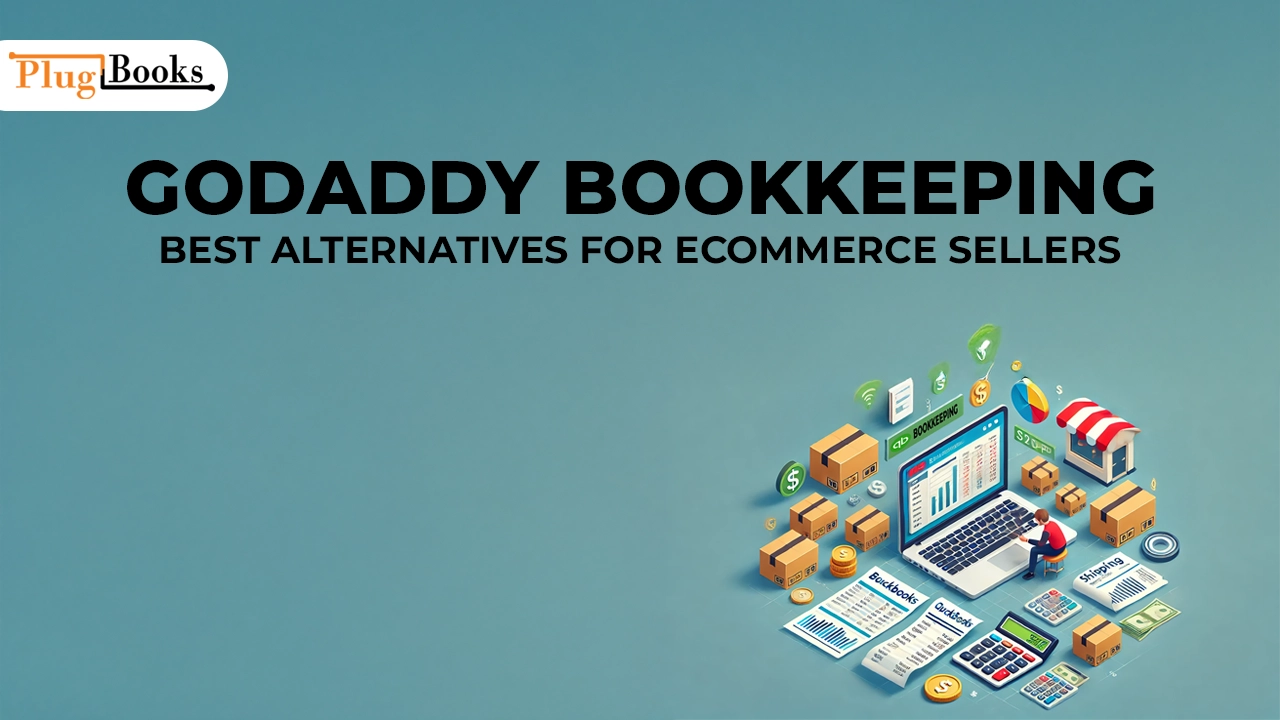Managing bookkeeping can be a challenging task for eCommerce sellers. Whether you’re selling on platforms like eBay, Amazon, or Shopify, having the right accounting software is crucial for keeping your finances in check. While GoDaddy Bookkeeping has been a popular choice for many small business owners, it may not be the best fit for everyone. Luckily, there are excellent alternatives that cater to the unique needs of eCommerce sellers.
What is GoDaddy Bookkeeping?
GoDaddy Bookkeeping is an online accounting software designed for small business owners and eCommerce sellers. It helps users track their income and expenses, generate invoices, and even calculate taxes. The software integrates with PayPal, eBay, and other platforms, making it easy to sync financial data.
However, as businesses grow, the limitations of GoDaddy Bookkeeping become apparent. Whether it’s restricted reporting features, scalability issues, or pricing concerns, some sellers find they need a more robust solution. This is where GoDaddy Bookkeeping alternatives come into play.
Why Consider GoDaddy Bookkeeping Alternatives?
While GoDaddy Bookkeeping is a convenient option for smaller businesses, there are a few reasons you may want to explore alternatives:
- Limited Reporting: GoDaddy Bookkeeping doesn’t offer deep customization for reports, which can be a limitation if you need detailed insights into your business finances.
- Pricing: The pricing structure can get expensive, especially when you factor in the features included in lower-tier plans.
- Scalability: As your business expands, you may require more advanced features that Bookkeeping lacks.
If you’re facing these challenges, it might be time to explore alternative solutions that offer more features and flexibility.

Top 4 Alternatives for eCommerce Sellers
1. PlugBooks: The Ultimate Integration Tool
When looking for GoDaddy Bookkeeping alternatives, PlugBooks is one of the best options, especially for eBay, Amazon, and Shopify sellers. Unlike traditional accounting software, PlugBooks is an integration platform designed to sync your eCommerce platforms with accounting software. It doesn’t replace accounting software but rather enhances it by automating the flow of financial data between platforms like Shopify, Amazon, and QuickBooks or Xero.
Why Choose PlugBooks?
- Seamless Integration: PlugBooks connects with popular eCommerce platforms and accounting software like QuickBooks and Xero.
- Automated Bookkeeping: It automates the transfer of sales data, including expenses, fees, and taxes, reducing manual data entry.
- Time Saving: It saves hours by automatically syncing your transaction data, allowing you to focus on growing your business.
PlugBooks is ideal for businesses that already use accounting software but need an efficient way to streamline eCommerce bookkeeping. You can explore more about PlugBooks here.

2. QuickBooks Online
QuickBooks Online is a powerful accounting software that offers comprehensive features suitable for eCommerce sellers. It helps businesses track income, expenses, generate invoices, and manage taxes. With strong integrations with platforms like eBay, Amazon, and Shopify, QuickBooks is a go-to tool for many small businesses looking to streamline their finances.
Why Choose QuickBooks Online?
- Comprehensive Accounting: Manage invoicing, payroll, and taxes all in one place.
- Customizable Reports: QuickBooks offers detailed reporting to help you make informed business decisions.
- Scalable: As your business grows, QuickBooks can grow with you, offering advanced features like inventory tracking and budgeting.
3. Xero
Xero is another popular accounting tool that is particularly favored for its user-friendly interface and comprehensive features. With Xero, you can manage finances, track inventory, and generate customizable reports. It also integrates smoothly with Shopify, Amazon, and eBay, providing a holistic view of your business’s financial health.
Why Choose Xero?
- Cloud-Based: Accessible from anywhere, allowing you to manage your finances on the go.
- Strong Integrations: Works with many eCommerce platforms and third-party apps.
- Comprehensive Financial Reports: Xero offers detailed reports that help you understand cash flow and profitability.
4. Wave Accounting
For small businesses with a tight budget, Wave Accounting is a free alternative to GoDaddy Bookkeeping. It offers basic accounting features, including income and expense tracking, invoicing, and reporting. While it doesn’t have all the bells and whistles of paid software, Wave is a solid choice for those just starting out or with simpler bookkeeping needs.
Why Choose Wave?
- Free: Wave offers a no-cost option for basic bookkeeping features.
- User-Friendly: The platform is easy to use, even for beginners.
- Integrations: Wave integrates with Shopify, PayPal, and other platforms to sync your sales data.
How to Choose the Right Bookkeeping Tool for Your eCommerce Business
Selecting the best bookkeeping tool for your business involves considering various factors:
- Integration with eCommerce Platforms: Make sure the software integrates seamlessly with the platforms you use (e.g., eBay, Amazon, Shopify).
- Features: Evaluate whether the software offers the features you need, such as tax calculations, reporting, or inventory management.
- Pricing: Compare pricing structures to find an option that fits your budget.
- Scalability: Consider your long-term needs. Choose a tool that can grow with your business.
- Support: Look for tools with reliable customer support to help you resolve issues quickly.
Final Thoughts
Your choice of bookkeeping software plays a crucial role in how efficiently you manage your eCommerce finances. Whether you continue using GoDaddy Bookkeeping or switch to one of its alternatives, make sure the tool fits your specific needs and budget.
For those looking for an integration platform to streamline their bookkeeping across multiple platforms, PlugBooks is a standout option. If you need more advanced accounting features, QuickBooks Online or Xero might be the way to go. For businesses on a budget, Wave Accounting offers a free, yet capable, solution.
By choosing the right tool, you’ll be able to focus less on bookkeeping and more on growing your business.
FAQs
1. What is PlugBooks?
PlugBooks is an integration tool that connects eCommerce platforms like Shopify, eBay, and Amazon to accounting software, making bookkeeping easier and more automated.
2. Can PlugBooks replace accounting software?
No, PlugBooks doesn’t replace accounting software. Instead, it integrates with existing tools like QuickBooks and Xero to streamline bookkeeping tasks.
3. How does PlugBooks automate bookkeeping?
PlugBooks automatically syncs sales data, including transactions, fees, and taxes, from your eCommerce platforms to your accounting software, saving time on manual data entry.
4. Is Wave Accounting really free?
Yes, Wave Accounting is free for basic accounting features such as invoicing, income and expense tracking, and reporting.
5. Can QuickBooks handle eCommerce sales tax?
Yes, QuickBooks Online has features for tracking and calculating sales tax, which is essential for eCommerce businesses.



